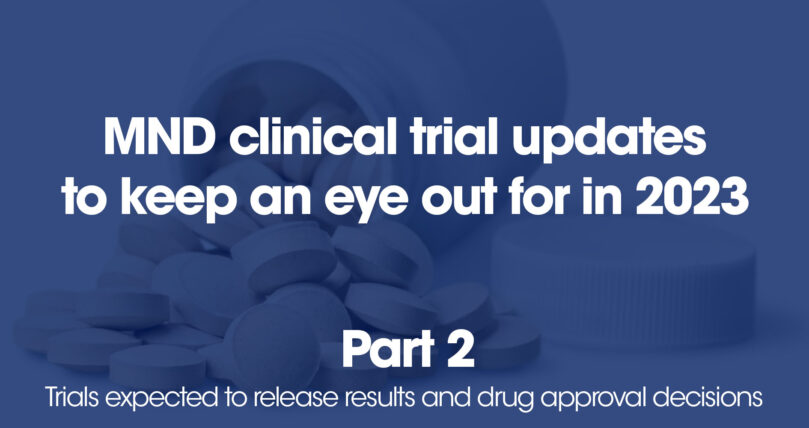Last year was a really exciting year for MND clinical trials, with more trials recruiting in the UK than ever before, some promising results being released, and some drugs being approved by certain regulatory authorities. We hope that the momentum will continue this year and want to highlight just some of the updates we are expecting from clinical trials throughout 2023.
The final part of this two part series covers clinical trials which are expected to release topline results and drugs that are awaiting approval decisions. If you need to catch up on part 1 of this series, you can read it here.
Topline Results Expected in 2023
Healey platform trial regimen D- Priopidine
The Healey trial is a platform trial in the US which is hoping to accelerate the process of finding new treatments for MND. The trial is testing multiple drugs at the same time and drugs can be added or removed throughout the trial. Participants have a greater chance of being on a potential treatment than placebo due to the number of drugs being trialled. There are 5 drugs that have been or are still being tested through the trial and these include zilucoplan, verdiperstat, CNM-Au8, Pridopidine and Trehalose. Results from the first three drugs have been released and we expect top-line results from Pridopidine to be released this year. You can find out more about the trial and the results that have already been released here.
Tauroursodeoxycholic acid (TUDCA-ALS)
Tauroursodeoxycholic acid (TUDCA) is a substance which is naturally produced in the body in small amounts and is one half of the combination drug AMX0035. TUDCA is licensed in the US to treat some diseases affecting the Liver but previous research has suggested that it may also be beneficial for treating neurodegenerative diseases, like MND. It is thought that TUDCA might dampen the action of a stress chemical which is known to trigger a chemical response that leads to the death of damaged cells. The TUDCA-ALS trial, assessing the safety and efficacy of the substance, is fully recruited and top-line results are expected to be released in 2023. More information about this trial can be found here.
Approval Decisions Expected in 2023
Tofersen- FDA and EMA decisions
Tofersen, a gene therapy designed to treat SOD1 MND, has been tested in a phase 3 trial called VALOR. This trial investigated the effectiveness of this therapy in people with MND who have mutations in the SOD1 gene. Results from this trial, published in September 2022, showed that Tofersen lowered levels of the faulty SOD1 protein, lowered levels of a marker of nerve damage called Neurofilament light chain and increased survival. You can read more about these results here. Following these promising results, Biogen (the company developing the therapy) submitted a New Drug Application to the FDA which is being reviewed. Earlier this month, Biogen announced that the FDA will hold an Advisory Committee Meeting to discuss the application for the approval of Tofersen. This meeting will be held on the 22nd March 2023.
A marketing authorisation application for Tofersen has been submitted to the European Medical Agency (EMA). This application is being reviewed by the Committee for Medicinal Products for Human Use (CHMP) and we hope to hear the outcome of the review this year.
RELATED TOPIC
Blog | 10 June 2022 | Charlotte Roy
VALOR Biogen’s Tofersen trial: a look at the open label extension data
AMX0035- EMA decision
AMX0035, a combination of two compounds called TUDCA (also known as TURSO) and Sodium Phenylbutyrate, may help to increase the survival of motor neurons. TUDCA is thought to reduce cell death by dampening the action of cell death pathways and Sodium Phenylbutyrate has been suggested to reduce the stress on the endoplasmic reticulum (ER), which helps to maintain the balance of proteins in the cell. The phase 2 trial of AMX0035 aimed to investigate the safety and effectiveness of the drug for people with MND. Results of the trial, released in 2021, showed some encouraging findings and the drug was approved by Health Canada and the FDA in 2022. Find out more about the trial results here.
Amylyx, the company behind the drug, have submitted a marketing authorisation application to the EMA for AMX0035 and this is still in the process of being reviewed. It is hoped that a decision will be announced this year and we will provide updates on this on our latest news page when we have more information.
RELATED TOPIC
Blog | 30 September 2022 | Charlotte Roy
What does the FDA approval of AMX0035 mean for the UK MND community?
Masitinib- Health Canada and EMA decisions
Masitinib is a compound which has been designed to target and block the action of an enzyme called tyrosine kinase. This enzyme has been shown to play a role in causing inflammation in the brain and spinal cord. It is thought that excessive inflammation could be involved in the rate of disease progression in people with MND. Reducing the activity of the tyrosine kinase enzyme may help to keep levels of inflammation under control and this could lead to a slowing in disease progression. The phase 2/3 trial demonstrated some promising results, with evidence of treatment helping to slow functional decline in people with MND. The ongoing phase 3 trial aims to build on these findings to test the effectiveness of the drug in a larger group of people. You can find out more about Masitinib here.
The company developing the drug, AB Science, have submitted applications to both Health Canada and the EMA for the approval of Masitinib based on data from the phase2/3 trial. Health Canada have asked for additional information about the drug before continuing to review the application and the review has been paused while they await this information. An application has been made to the EMA for conditional marketing authorisation. Conditional marketing authorisation means that if the drug is approved, additional data will be needed from the ongoing Phase 3 trial to maintain approval. The application is being reviewed by the CHMP and a decision on whether to approve or not is expected this year.
What do these applications mean for the UK MND Community?
It is important to note that approval by the FDA or EMA does not mean that the treatment will be licensed in the UK. If a treatment is reviewed by the EMA/CHMP and has a positive outcome, an application can then be made to the Medicines and Healthcare products Regulatory Agency (MHRA) – the authorising body in the UK. The MHRA will then review the application and make a decision on UK licensing. We will share updates and outcomes of the applications on our latest news page when we have more information.
We know keeping up to date with clinical trial news is very important to the MND community so we endeavour to share the latest updates through our twitter account, research monthly newsletter and latest news page.
Clinical trials wouldn’t be possible without the dedication, generosity and commitment of researchers, health care professionals and the MND community. Thank you to everyone who is involved in these trials and contributing towards the growing clinical trial landscape testing new potential treatments for MND.
*The information in this blog was correct at the time of publication.








